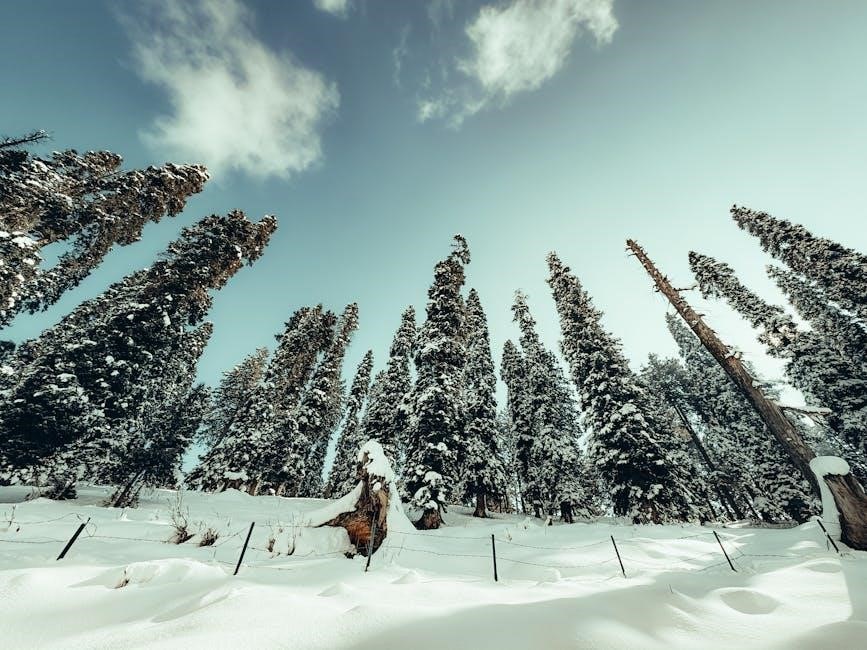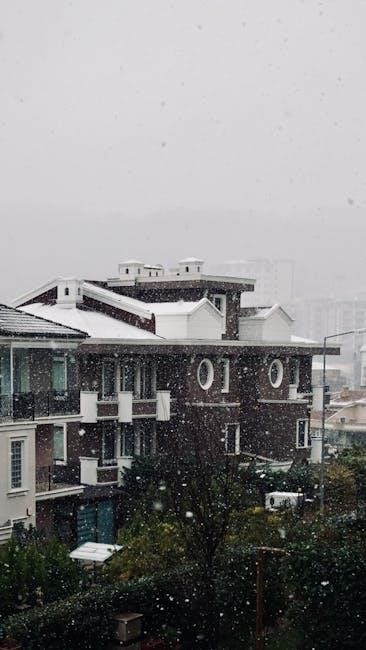
collected poems of robert frost pdf
The Collected Poems of Robert Frost: A Comprehensive Overview

Robert Frost’s Collected Poems is a definitive anthology showcasing his masterful exploration of nature, human isolation, and rural life. Published in 1930, it includes iconic works like “The Road Not Taken,” highlighting Frost’s accessible yet profound style. The collection is widely available in PDF and digital formats, ensuring accessibility for modern readers. Rare editions are sought after by collectors, while libraries like Dartmouth College house extensive manuscript collections, preserving Frost’s literary legacy.

Biography of Robert Frost
Robert Frost, born in 1874, was an American poet known for his rural New England settings and deep exploration of human nature. He attended Dartmouth College, later returning as a lecturer, and published seminal works like New Hampshire, solidifying his literary legacy.

Early Life and Education
Robert Frost was born in 1874 in San Francisco, California. After his father’s death, his family moved to New England, a region that deeply influenced his writing. Frost attended Dartmouth College but did not graduate, later enrolling at Harvard University, where he also left without a degree. His early life was marked by a connection to rural landscapes and a developing passion for poetry, which would later define his career and appear in collections like New Hampshire and Collected Poems.
Literary Career and Major Works
Robert Frost’s literary career spanned over five decades, earning him four Pulitzer Prizes for Poetry. His early work, such as New Hampshire (1923), established his reputation for capturing rural life and nature. Frost’s poetry is renowned for its accessibility and depth, often exploring themes of isolation and existential reflection. Major works include Collected Poems (1930), A Further Range (1936), and A Witness Tree (1942). His unique style, blending traditional forms with modern insights, solidified his legacy as one of the 20th century’s most influential poets.

Major Collections of Poems
Robert Frost’s notable collections include New Hampshire (1923), Collected Poems (1930), A Further Range (1936), and A Witness Tree (1942). These works contain some of his most celebrated poems, exploring nature and human themes, and are widely available in digital formats like PDF.
New Hampshire (1923)
New Hampshire (1923) is Robert Frost’s second collection of poems, featuring works that explore rural life and natural landscapes. The title poem, New Hampshire, pays tribute to the state’s beauty and culture. This collection solidified Frost’s reputation as a master of rural poetry, blending accessible language with profound themes. It includes some of his most celebrated poems, offering insights into human existence and nature’s symbolism. The collection is widely available in digital formats, including PDF, making it accessible to modern readers while preserving its timeless appeal.
Collected Poems (1930)
Collected Poems (1930) is a landmark anthology that compiles Robert Frost’s most celebrated works, including “The Road Not Taken” and “Stopping by Woods on a Snowy Evening.” This collection highlights Frost’s mastery of blending nature with deep philosophical insights. Published by Holt, Rinehart and Winston, it solidified his reputation as a leading poet of the 20th century. The anthology is part of the Library of America series, edited by Richard Poirier and Mark Richardson, and remains widely available in digital formats, including PDF, ensuring its timeless accessibility to readers worldwide.
A Further Range (1936)
A Further Range (1936) is a significant collection of Robert Frost’s poetry, continuing his exploration of nature and human existence. Published by Holt, Rinehart and Winston, it features poems that reflect Frost’s rural New England roots. This collection further cemented his reputation as a master of lyrical and contemplative verse. A Further Range is part of Frost’s complete works available in digital formats, including PDF, allowing readers to explore his evolving style and profound insights into life and nature.
A Witness Tree (1942)
A Witness Tree (1942) is a collection of Robert Frost’s poems, reflecting his deep connection to nature and human experience. The title refers to a tree that stands as a silent observer to the passage of time. This work captures Frost’s ability to transform ordinary scenes into profound meditations. Available in PDF and digital formats, A Witness Tree remains a testament to Frost’s enduring legacy, offering readers a glimpse into his poetic philosophy and the timeless beauty of his craft.

Themes and Style in Frost’s Poetry
Frost’s poetry explores themes of nature, human isolation, and existential inquiry, blending rural settings with profound symbolism. His accessible language and contemplative tone resonate deeply, making complex ideas relatable.
Nature and Its Symbolism
Robert Frost’s poetry often revolves around nature, using it as a mirror to human emotions and existential themes. Trees, snow, and rural landscapes are frequent motifs, symbolizing life’s complexities. In poems like “The Road Not Taken” and “Stopping by Woods on a Snowy Evening,” nature serves as a backdrop for introspection and philosophical inquiry; Frost’s ability to infuse ordinary natural scenes with profound meaning has made his work timeless. His use of nature not only reflects his deep connection to the environment but also underscores the universal human experience of grappling with life’s uncertainties.
Human Isolation and Existential Themes
Robert Frost’s poetry frequently explores themes of human isolation and existential contemplation. His works often depict individuals in solitary rural settings, grappling with life’s inherent loneliness and philosophical dilemmas. Poems like “The Road Not Taken” and “Stopping by Woods on a Snowy Evening” reflect Frost’s fascination with human isolation and the search for meaning in a vast, indifferent world. These themes resonate deeply, as Frost masterfully captures the universal experience of feeling disconnected while navigating life’s complexities and uncertainties.
Accessible Language and Rural Settings
Robert Frost’s poetry is renowned for its accessible language and vivid rural settings, which draw readers into familiar yet profound landscapes. His use of everyday speech and relatable scenarios makes complex themes approachable. Poems like “The Road Not Taken” and “Stopping by Woods on a Snowy Evening” capture the essence of rural life, blending simplicity with depth. Frost’s ability to evoke universal truths through local, pastoral imagery has made his work timeless and widely accessible, resonating with readers across generations and cultural boundaries.

Legacy and Impact
Robert Frost’s poetry left an enduring impact on modern literature, earning him four Pulitzer Prizes and a reputation as a master of rural-themed, accessible verse. His work continues to influence poets globally, cementing his legacy as one of the most celebrated American poets of the 20th century.
Influence on Modern Poetry
Robert Frost’s poetry has profoundly influenced modern verse, inspiring generations with its accessible language and profound exploration of nature and human existence. His use of rural settings and symbolism has shaped contemporary poets’ approaches to themes like isolation and existential inquiry. Frost’s mastery of traditional forms, combined with his innovative style, has encouraged poets to experiment while maintaining emotional depth. His work remains a cornerstone of American literature, continuing to inspire poets to explore the intersection of nature, identity, and universal truths in their own writing.
Awards and Recognition
Robert Frost’s literary excellence earned him four Pulitzer Prizes for Poetry, solidifying his status as a premier American poet. His appointment as Vermont’s Poet Laureate from 1961 until his death in 1963 further cemented his legacy. Frost’s work continues to be celebrated, with institutions like Dartmouth College housing extensive collections of his manuscripts and letters, underscoring his enduring influence on poetry. His accessible style and profound themes remain unparalleled, making his Collected Poems a timeless treasure in American literature.
Availability and Accessibility
Robert Frost’s Collected Poems are widely available in PDF and digital formats, ensuring easy access for readers. Rare editions are also sought after by collectors and scholars.
Digital Formats and PDF Editions
Robert Frost’s Collected Poems are widely available in digital formats, including PDF editions, making his work accessible to a global audience. These digital versions are often free or low-cost, enabling easy download and reading on various devices. Platforms like the Internet Archive and online libraries offer these resources, preserving Frost’s literary legacy for future generations. Digital formats enhance readability and convenience, allowing readers to explore Frost’s timeless poetry with ease. This accessibility has made his work a staple in both academic and personal libraries worldwide.
Rare and Collectible Editions
Rare editions of Robert Frost’s Collected Poems are highly sought after by collectors and literary enthusiasts. Limited print runs, signed copies, and unique bindings make these editions invaluable. Institutions like Dartmouth College house extensive collections, including original manuscripts and rare publications; These treasures offer insights into Frost’s creative process and remain cherished possessions for those who appreciate his literary genius. Rare editions are often found in specialized libraries or auction houses, making them a prized addition to any poetry collection.